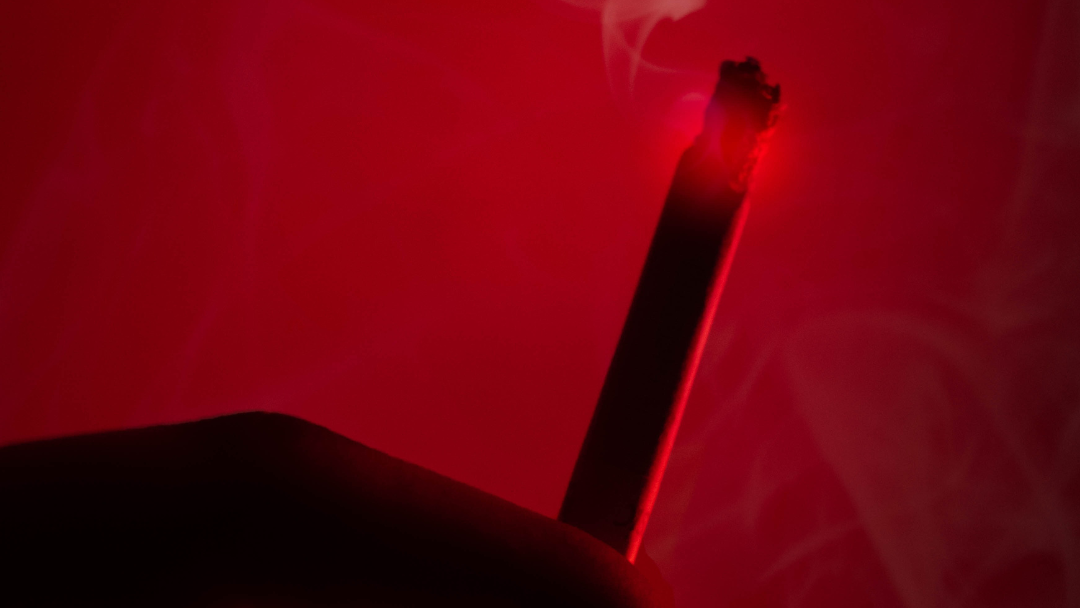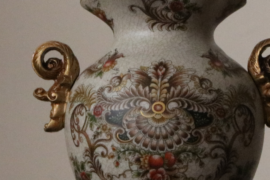IT WAS APRIL WHEN THE FIRST OF THE WOLVES ARRIVED ON SEVENTH STREET and his wife confessed she did not love him anymore. It was April and there were daffodils blooming in curbside patches of earth, yellow as yolks, and pink-tendrilled cherry trees blossoming above. In a line they came, these first three wolves, heads and tails down, sweeping with their noses and keeping to the shadowy southern side of the street while the last of the sunlight washed across the facades of the brownstones on the northern side. Ezra spotted them from the window of the front bedroom, two stories up, and fumbled for his phone, but he took his photo too late and from too poor a position to capture anything more than a faint disruption to the darkness below. Nevertheless he sent the photo to Emma.
!!!, he wrote.
Her reply came several minutes later. ?, it said.
Wolves, wrote Ezra.
For two minutes and thirty-seven seconds there was nothing. Then there were three little dots. Eleven seconds later the dots disappeared, and there was nothing else from her all evening.
In the morning he was up before Jack and Miles, but not long enough before them to make any coffee or think any thoughts. He stood in the kitchen for a moment, the knuckles of one hand on the table, watching daylight creep along the cornice of the building behind his own, and then they were at him: needing breakfast, needing pants, needing socks—but not those socks—needing sandwiches and bottles of water, and apple slices which would just come back with them in the afternoon but Emma insisted, needing certain books and whatever completed assignments he’d been able to squeeze out of them the evening before, needing reminders to use the bathroom, needing all the while to share with him theories about Godzilla and facts about sea mammals and natural disasters, and to argue with each other about these theories and facts, and to see how close they could come to kicking each other without getting into trouble, and needing shoes and—No, Jack, that’s the wrong foot—and sweaters and jackets or maybe just jackets or maybe just sweaters because it was April, and a ten-minute warning and a five-minute warning and a one-minute hustle, and along the way he found a pair of sweats and a pair of sneakers and his glasses and his laptop and a jacket of his own, and then they were down the musty peeling-paint stairwell and onto the springlit sidewalk heading east, in the direction the—
Wolves—
had gone.
Having delivered his children to their school, Ezra sat with a cup of black coffee at Café Claude and opened his laptop, but he did not do anything with it, because he was listening to the conversations around him, curious as to whether anyone would mention the wolves. But no one did. Three little dots appeared in his mind’s eye, where they lingered for several minutes, and then they disappeared. He drank his coffee, closed his laptop, and went home.
Emma was back from Chicago in the evening. Ezra was in the kitchen, at the opposite end of the hallway from the front door, and his hands were coated with raw chicken and there was water just coming to a boil on the stove, so he did not go to the door to greet her, and she did not come to him; she found Miles and Jack watching videos in the living room and he heard her with them, heard Miles explaining something about Godzilla in considerable detail, and then at last she came halfway down the hall toward him, still in her blue coat, the one she’d bought just before Europe, and she said hello and he said hello and welcome back and he smiled at her, and she smiled at him and said thank you, and then she went into the bedroom, and he went on making dinner.
Twenty minutes later he called everyone to the table. She appeared in the tight-fitting jeans and the black tank top she must have traveled in, and he was aware of the ever-there feeling for her in his stomach and so he could not eat very much of what he had made, and she asked how everyone’s week had been and she said a few things about Chicago, telling Miles and Jack about the skyscrapers and the river that ran backwards, and she didn’t look at him very much, but she was still dressed and they had been a week apart so he thought perhaps that later she might want to be intimate with him, and so after dinner he told her to relax and she went into the bedroom again and he rushed Miles and Jack through the bedtime routine, reading them only a chapter instead of two, and when the boys were in their room with the door closed he went into the front bedroom and she was there on the bed, but she had changed into an old t-shirt and sweats and she was reading a novel. But the ever-there feeling was there, still, anyway.
He lay beside her on the bed, pulled his phone from his pocket and then thought he ought not to look at it now, so he set it on the bedside table. So you had a good trip?, he asked.
Yes, she said, holding the novel on her stomach with her thumb stuck inside it. It was busy. How were things with the kids?
Things were fine, he said, and he told her about building cardboard towers with Miles, and about Jack’s progress in the pronunciation of his Ls and a few other things as well, and she seemed to appreciate the information, but though he was desperate to talk with her about anything other than the kids, his pause after the kid-info part of the conversation was too long and she went back to reading her novel, so he lay beside her, not looking at anything. After a few moments she seemed to sense—no, she had sensed it immediately, but after a few moments she gave into—his restlessness for more, and she put the novel down again.
So what was that about wolves?, she asked.
There were wolves, he said. Three of them, walking right up our street. Just before sunset yesterday.
Are you sure they were wolves?
I’m sure, he said. They were definitely wolves.
That’s very strange, she said.
I know, he said. I think they were heading toward the park. He felt as though he ought to say more about it, but there wasn’t much else he could say, having glimpsed the wolves so briefly, and only once.
She lifted the book again and peered into it but he could tell, even without looking directly, that she was not reading it.
Is there something you want to talk about?, he asked her.
For a long moment she said nothing, and then she sighed, very quietly. Not tonight, she said. I’m really tired.
Soon after this she was asleep. Ezra could not be asleep and knew that he would probably not be able to be asleep until at least after she had said whatever it was she did not want to say tonight. It bothered him that she was able to be asleep under these circumstances. Near midnight, he propped himself up and looked through the window, which was just above the head of the bed. For many minutes there was nothing to see but the facades of the opposite-side buildings, and the glow of a streetlight on the infant leaves of a scrawny sidewalk tree. Then there was a silverness, creeping east, and another behind it, and another, and a fourth, and each silverness emerged for a moment into the lamplight and was a wolf, and passed back into darkness, becoming only a silverness again. As Ezra watched them, he felt the ever-there feeling in his stomach opening out, becoming something broader. This sensation pushed him to swing his feet down from the bed and to find his shoes in the dark bedroom, and to find his jacket in the hall and slip through the apartment door and down the stairwell to the street. He shivered once in the chilly air and heard nothing but a few distant motors, and peered east, uphill, in the direction of the park. There might have been a glint or two of silver, about a block ahead of him. Hands in the pockets of his jacket, he walked toward the glints. A skein of cloud had come in to cover the sky, bulging in one corner with suppressed moonlight, and a breeze tumbled down Seventh Street toward him, needling his face. With each avenue he crossed he drew closer to the park, but no closer to the glints, which kept always a block ahead of him. At last the glints reached the boundary of the park and became for a moment a single, still silverness, and then the silverness disappeared, and there was only darkness and lamplight ahead.
Shortly after, Ezra came to the low stone wall dividing the park from the rest of the neighborhood, and he peered ahead, into the lightless gaps between the trees. For a moment he thought that he might climb over the wall and go into the woods. But he did not.
#
The next day, while Miles and Jack were at school, Emma confessed that she had not loved Ezra in seven years.
#
In the evening, Ezra read to the twins from The Little Prince.
You become responsible, forever, for what you have tamed, he read.
When the boys were asleep, Ezra did not go into the front bedroom. Instead he stood in the hall, one hand on his jacket, which hung from a hook beside the front door. Outside, he knew, it was raining lightly, and a little of the old winter darkness had crept back in to smudge away the last of the daylight. But he could not bear to be in the apartment, and so he slipped the jacket on and went out into the evening. First he walked to the deli, where he bought himself a packet of cigarettes for the first time in eleven years. He smoked two of them, in quick succession, and they made him so dizzy that he had to sit on a stranger’s stoop until his head had cleared. After this he walked in the direction of the park. His jeans kept slipping down over his hips, and it occurred to him that he must have lost weight. He had been without a body for so long, he realized; he’d been little more than a ball of signals inside his own brain, and his body had gone off on its own, shapeless, balding and insensate, belonging to no one, and no wonder Emma wanted nothing to do with it, or maybe he had banished his body because she didn’t want it; nothing about this was clear to him. Now it was thinner, not because he had been caring for it but because lately his mind had substituted anxiety for appetite, as if to punish his body for leaving him. He felt the urge to get himself a tattoo, and he knew at once how stupid the idea was, how very little and late it was, like buying flowers for an estranged—
for an estranged spouse, but—
in any case it didn’t matter, because his body had nothing to do with it, she said. Nothing had anything to do with it. There was nothing he had done to make her stop loving him, she said, and there was nothing he could do to make her love him again. Ezra, his body, and his mind, had no role in this situation at all.
The misty lamplit sidewalk bordering the park was empty. If the wolves came, there would be no one but Ezra to see them. He did not really suppose the wolves would come; he supposed he had imagined them all along, since no one in two days had said anything about them. From this lack of faith he drew more courage than the prior night’s curiosity had allowed him, and he levered himself over the wall and into the dark blue grass beyond. From here it was only a few steps to the line of the trees, and he covered the ground without hesitation, pausing only briefly at the edge of the wood before slipping into the shadows.
Once inside, he did not know what to do. Wait here, he supposed, and see. He could not sit on the wet, rough ground, so he stood beneath a tree—he thought maybe it was a birch—and took out another cigarette and smoked it, until he imagined how it would look to anyone passing by, this shapeless middle-aged shadow smoking in a dark copse of dripping trees, and he stabbed the cigarette out in the dirt and, not wishing to litter, squished the wet butt into the pocket of his jeans.
He waited.
My heart, he thought. My faithful heart.
In his faithful heart he knew that they would come, the wolves, eyes aglow in their file, up Seventh Street and into this wood. They would pass beside him, nearly close enough to touch—close enough that even in the darkness they would be visible in their scarred and ragged reality, in their silver beauty. They would pass beside him and into the deeper darkness beyond, and he would follow.
In his faithful heart he knew that he would follow them into that deeper darkness.
He knew in his faithful heart that they would not harm him, though neither would they give any assurance of his safety; they were savage things, incarnations of danger, and they would concede none of their nature to him, but he would follow. And by following he would be in some way one of them.
In Ezra’s faithful heart he knew that the deeper darkness of the park was wilder tonight than ever it had been; there were no benches or fences tonight, no paths or paving stones, no lamps, no bins. The park was no longer the park; it was wild calling unto wild, and the wolves would answer, and he would answer too, and in his answer he would find the wild part within himself, that desirable part, that untamed part impervious to the atrocity Emma had inflicted upon him for it was terrible to tame a creature and then to cease loving it; to cease loving it because it was tame. It was terrible but in himself his faithful heart believed there was an untamed being, the being he had been in the first of his days and years with her, the self he supposed she had loved before she tamed it away, and his heart his faithful heart knew that the wolves would come and he would follow them into the darkness where his wild self still dwelled.
And so he waited there, under the beech tree, in the drizzle, in the night. He waited, until at last he understood that they would not come. Maybe they had come and he had not seen them; maybe they had gone away to somewhere else; maybe they had never been there at all. Tonight, in any case, they would not come. He went home wet, shivering, and stinking of the cigarette butt in his pocket, and sat in a kitchen chair until dawn.
#
In that summer wildness overcame the world. The hedges burst their borders and no one could contain them; vines invaded every crevice and wove themselves across the buildings and the sidewalks and crawled up the lampposts and pulled them to pieces; the scrawny street trees grew into towering, muscular maples and oaks; the pavements all gave way to grasses; and every sort of beast from bear to bobcat came to stalk the verdant gullies where the streets had been. Everyone began to say that there was no difference between growth and catastrophe; everyone marked that summer as the first of the last of civilization’s seasons; everyone looked back in humanity’s dwindling days to that same summer, and said that that was when the change had come. On the day in July when Emma moved to Manhattan, taking Jack and Miles with her, a beaver dam blocked the Harlem River and the South Bronx was flooded away, and neighborhood by neighborhood from then the city fell to the wildness.
But everything had changed already. This Ezra knew. Had anyone peered into the cracks they would have seen: how years ago already the wildness had taken root, indifferent to human design, germinating all throughout the ordinary days, all through the days of comfort and routine. Look at the fissure in the sidewalk where the grasses grow through; look while you pass by, your hand in someone else’s hand, your child on little wheels ahead of you. Look and know it is not for you to master, and neither when the season comes will you be able to save yourself. It is happening already, and it was this message Ezra wished he could send backwards to himself through time. It is happening already and there is nothing you can do; it has nothing to do with you at all.
PAUL. H. CURTIS is a writer and editor living in Yonkers, New York. He is the events coordinator, as well as a fiction reader, for Fatal Flaw literary magazine in New York. His writing has appeared in publications including Cherry Tree, Levee Magazine, The Madison Review, Zone 3 Press, Inkwell Journal, Prose Online, and Construction literary magazine, as well as in Fatal Flaw, and is forthcoming in Rockvale Review and Box–A Journal. Find him online at www.paulhcurtis.net, or on Instagram @paul.h.curtis.
Like what you’re reading?
Get new stories or poetry sent to your inbox. Drop your email below to start >>>
OR grab a print issue
Stories, poems and essays in a beautifully designed magazine you can hold in your hands.
GO TO ISSUESNEW book release
Ghosts Caught on Film by Barrett Bowlin. Order the book of which Dan Chaon calls “is a thrilling first collection that marks a beginning for a major talent.”
GET THE BOOK



